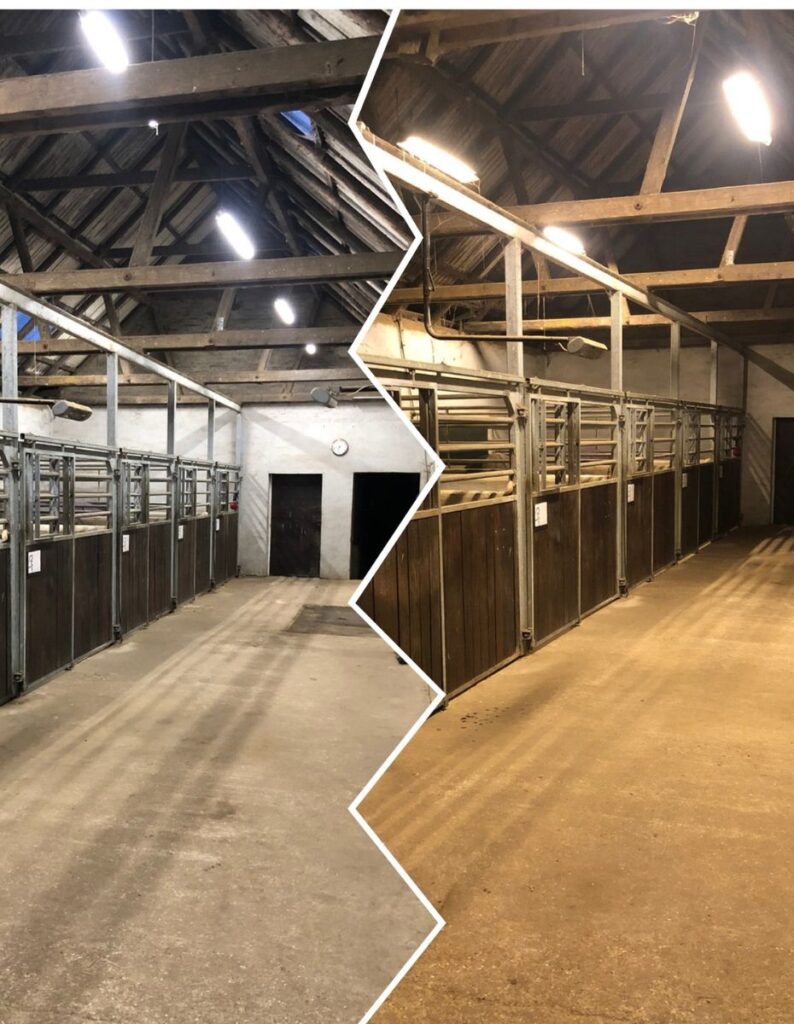Menu

We live in a time where sustainability is more important than ever if our descendants are to live somewhat the same life as we have lived. We need to lift together, and everyone must take responsibility. This is something we as horse people can do with small initiatives in our daily life in the stable and with the horses.
Therefore, we asked our readers what you do to become a bit more sustainable in the stable. Here are your best tips!
"We make to allow for nature to grow wildly. This provides rich plant- and animal life in the paddocks, which the horses also benefit from by having a more varied diet in the form of different grasses and herbs that grow freely. We, of course, remove poisonous plants – when the animals that feed on them are done with them. We have quite a few butterflies on the few foxgloves we have (due to clay soil)."
READ ALSO: So many kilometers does your horse walk in the paddock every single day
"Providing water in the paddocks and watering the indoor arena with rainwater."
"Manure for a biogas plant. That’s a good solution."
"Rainwater from the indoor arena roof is collected in large containers connected to a pump, so rainwater is used in the irrigation system."
"We have a huge tub under the downpipe in the open stable to save water. And we use rainwater for drinking water."

"Collecting rainwater for watering the indoor arena, timers on LED stable lights, and switching to LED lighting in the stable and arena. Better light at a better price!"
"I have solar panels on the roof of my indoor arena."
"LED lights in the stable and indoor arena. Can really be seen on the electricity bill."
"And of course, we have LED lighting."
"LED lights on the riding track, but not yet in the stable. Have a reasonably lit stable, so light is only necessary when it's dark outside."
"Buy second-hand gear. Bridles, pads, covers, etc. Everything that needs to be produced wears on our Earth."
"Like to buy used equipment and sell what I don't use. Buys quality equipment that lasts."
“Waste sorting, all used equipment is passed on or sold. We are willing to buy used equipment - only have what is absolutely necessary."
"The best way to be sustainable is probably to reduce consumption. Consider if the horse can do without a rug. Buy locally produced feed. Use hay instead of haylage if possible (use more roughage and less hard feed). Use straw from local farmers instead of various things in plastic bags. Wear out your riding equipment before buying new. I mean, recycling is great, but it is not the solution. It's raw materials and consumption we need to focus more on."
"And the blue straw strings are great for bundling cardboard for bulk waste. I know someone who uses threads from the green ones as gift ribbons, and it looks really nice. I gladly buy second-hand gear and sell what I don't use. I buy quality equipment that lasts. Hay strings are used to tie cardboard for bulk waste. Unfortunately, we cannot dispose of haylage plastic as bulk waste here (so we have to take it to the recycling centre ourselves), but as a consequence of that, I made a "garden figure" (free-range pig), where I then used haylage plastic to wrap around the pieces of wood in the figure (under the spruce)."

"Using feed bags for garbage bags, for transporting hay, for storage, overnight stays, and competitions. Taking all things from used blankets that can be reused. Saves some of the blue hay strings."
"We have acquired an extra waste bin in addition to those provided by the municipality so that we can separate soft plastic, as we are almost mass producers of it with all the things that come in plastic bags (wood pellets, feed, equipment, etc.)."
"We also struggle with plastic from haylage, but we do deliver it to the recycling station."
READ ALSO: The 5 biggest problems for horse's in frosty weather
"Besides buying most of our equipment used, reducing plastic consumption, reusing buckets, and using only hay as long as possible, we also have a large paddock that is not sprayed or fertilized. This means more wildlife, plants, and happy horses.
Our horses benefit greatly from the trees (bark), the lake (aquatic plants), plants such as nettles (nature's own health providers), organic apple trees (benefits horses, birds, and larvae), hills, and artificial burrows (shelter for the horses, dens for the foxes and ducks)."
"Second-hand riding gear, no food waste in the house (as there is always either a cat, dog, horse, or goat that can eat leftovers. Therefore, food being thrown out can be counted on one hand).
"The dung is spread on one's own land. Food scraps are given to the chickens. It is certainly not easy, but we do the best we can.”